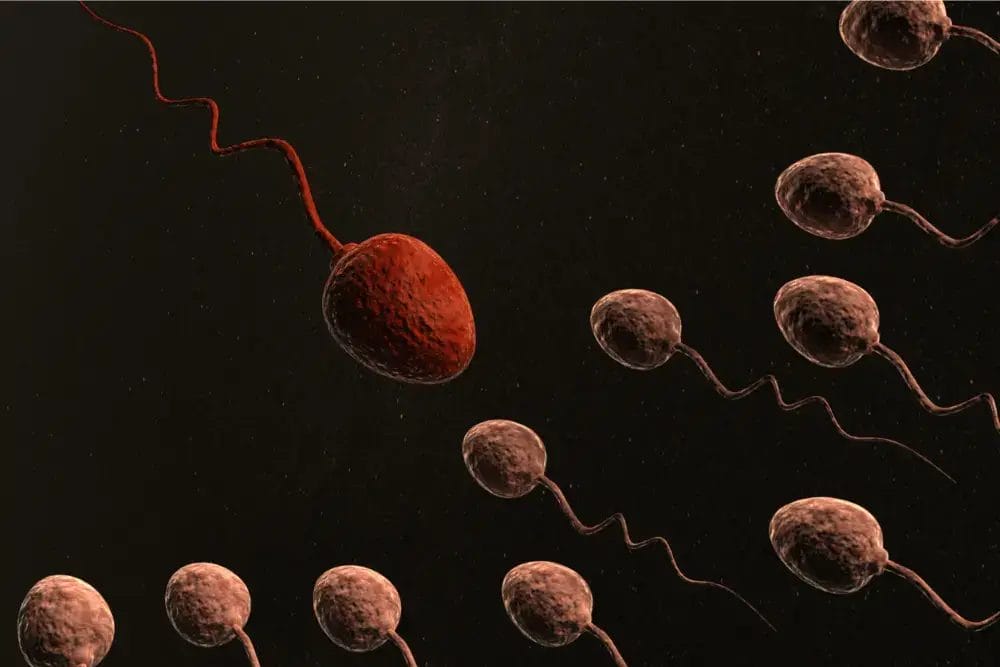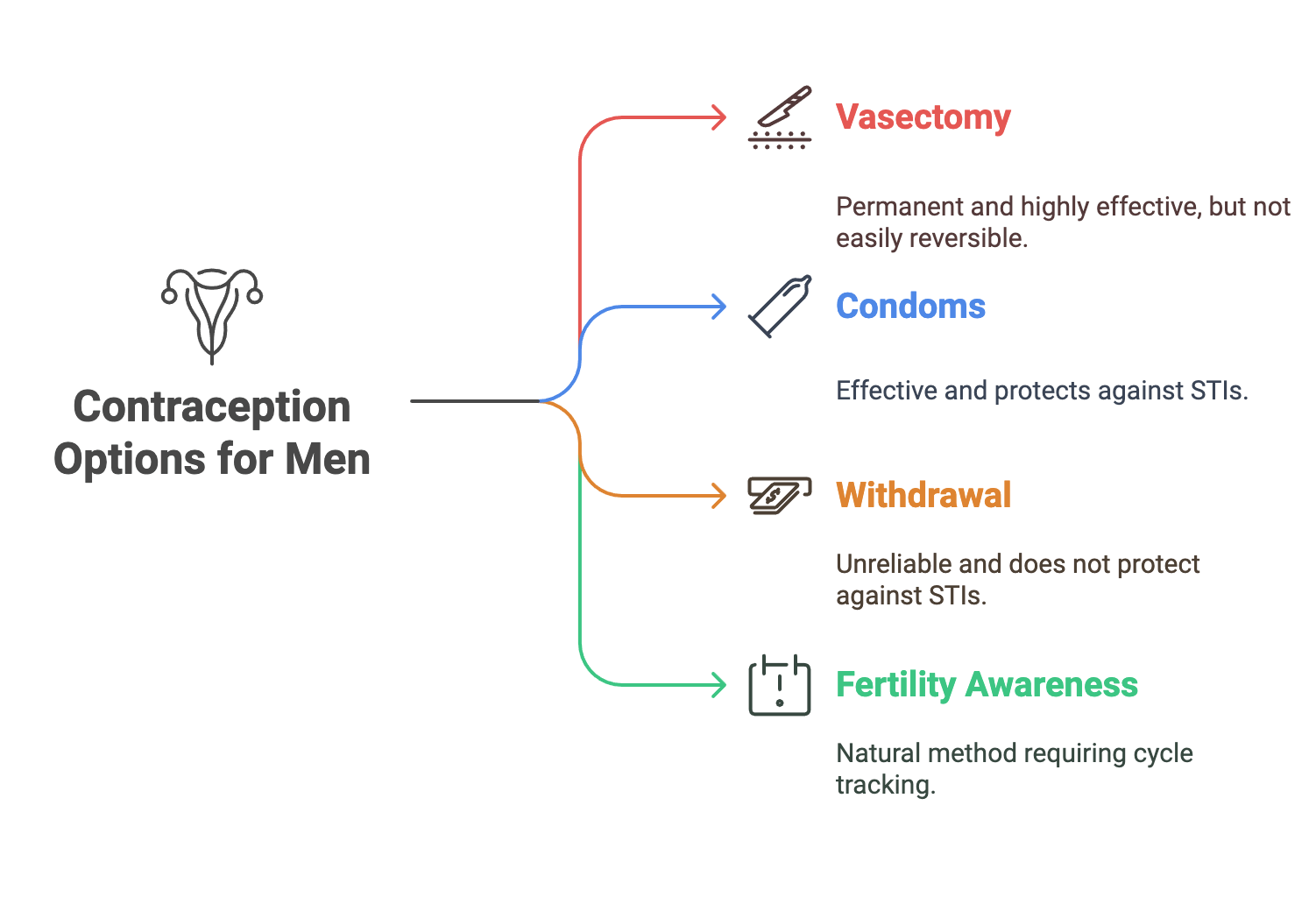Male fertility is a crucial but often overlooked aspect of reproductive health. While the focus of fertility treatments has traditionally been on women, more men are now seeking information and solutions for fertility issues. In this guide, we explore the emotional challenges, the importance of nutrition, and available contraception options for men. Here’s what you need to know.
Male Fertility: Understanding the Basics
Male fertility is based upon the quality and quantity of sperm produced, as well as the functionality of the male reproductive organs. Several factors can impact male fertility, including age, lifestyle, health conditions, and genetics. The most common cause of male infertility is low sperm count, but issues such as poor sperm motility (movement) or abnormal sperm morphology (shape) can also affect fertility. Many men don’t realize that infertility is just as much a male issue as a female one. Visiting a Men’s Health Clinic can provide essential insights and personalized treatment options, making it the first step toward addressing fertility concerns.

Emotional Challenges of Male Infertility
Male infertility can take a significant emotional toll on men and their partners. Unlike women, men may feel more isolated due to the societal stigma around male fertility issues. The emotional stress caused by the inability to conceive can lead to anxiety, depression, and a sense of inadequacy. Additionally, infertility can strain relationships, causing tension and communication breakdowns between partners. For men who have decided not to pursue fertility options, a no scalpel vasectomy offers a minimally invasive and effective method of permanent birth control, providing peace of mind and a sense of closure.
- Feelings of Shame and Inadequacy: Many men associate fertility with masculinity, so infertility may feel like a personal failure. The pressure to “fix” the problem often weighs heavily, leading to frustration and sadness.
- Mental Health and Infertility: Studies suggest that men dealing with infertility are more likely to experience mental health issues, including anxiety and depression. The emotional burden of infertility can also affect sexual intimacy, turning conception into a medical procedure rather than a joyful experience.
- Support and Counseling: Therapy and participating in support groups can be great resources for men facing infertility. Couples therapy and individual counseling help men cope with the emotional challenges of infertility, improve communication, and strengthen relationships.
Nutrition and Lifestyle Factors for Male Fertility
Good nutrition and a healthy lifestyle are essential to improving fertility. Proper nutrition supports sperm production and overall reproductive health, while unhealthy habits can impair fertility. Here’s how diet and lifestyle can impact male fertility:
- Diet and Nutrition: A diet rich in antioxidants, vitamins, and minerals is essential for sperm health. Zinc, selenium, vitamin C, and vitamin E are particularly important as they support sperm quality and reduce oxidative stress. Omega-3 fatty acids found in fish and flaxseeds can also improve sperm motility.
- Weight Management: Being overweight or obese can lead to hormonal imbalances that negatively affect sperm production. Maintaining a healthy weight can improve testosterone levels and sperm quality. Men who are overweight may also benefit from regular physical activity, which can boost sperm count and motility.
- Avoiding Toxins: Exposure to toxins, such as pesticides, chemicals, and pollutants, can harm sperm quality. Limiting alcohol, smoking, and illicit drug use can significantly improve fertility. Stress management is also essential, as high stress levels can lead to hormonal imbalances and decreased sperm production.
- Exercise: Regular moderate exercise is beneficial for overall health, but excessive exercise can lower testosterone levels and hinder fertility. Aim for a balanced exercise routine to maintain healthy testosterone levels and improve reproductive function.
Contraception Options for Men
Nowadays, men have more choices than ever when it comes to contraception. While traditional methods like condoms and vasectomy remain the most common, new research and innovations are coming out daily. Here are some of the main methods available:

- Vasectomy: A vasectomy is a permanent form of male contraception that involves cutting or sealing the vas deferens to prevent sperm from entering the semen. It’s about 99% effective but should be considered permanent. Vasectomy reversal is possible but not guaranteed.
- Condoms: Condoms are a barrier method that prevents sperm from entering the female reproductive tract. When used correctly, they are about 98% effective. Condoms are also the only contraceptive method that protects against sexually transmitted infections (STIs).
- Withdrawal: The withdrawal method, also known as “pulling out,” involves removing the penis before ejaculation. However, this method is unreliable, with an estimated 22% failure rate, and it does not protect against STIs.
- Fertility Awareness: Fertility awareness methods track a woman’s menstrual cycle to identify fertile windows. While this method requires close cooperation between partners, it can be effective for couples who prefer natural contraception.
Path to Parenthood: Male Fertility Treatments
For couples struggling with male infertility, several treatment options are available, including assisted reproductive technologies (ART). These treatments help overcome barriers to conception and increase the likelihood of successful pregnancy.
- Medications: Clomid, hCG injections, and other fertility medications can help stimulate sperm production. These medications are typically used for men with low testosterone levels or hormonal imbalances.
- Surgical Treatments: Surgical procedures like varicocele repair or sperm retrieval techniques (e.g., microTESE) can improve sperm count and quality in men with blockages or other fertility issues.
- Assisted Reproductive Technologies (ART): Techniques like IVF (In Vitro Fertilization), ICSI (Intracytoplasmic Sperm Injection), and IUI (Intrauterine Insemination) can help couples achieve pregnancy. ART is particularly useful for men with low sperm count or motility issues.
- Sperm Preservation: For men facing infertility due to medical treatments like chemotherapy, sperm banking allows them to preserve sperm for future use. Sperm can be stored and used in assisted reproduction procedures when the man is ready to start a family.
Empowering Men in Their Fertility Journey
Male fertility is an ever-changing issue that involves not only medical and physical aspects, but also its emotional and lifestyle impacts. Understanding the causes of male infertility, making informed lifestyle changes, and considering contraception options can empower men to make proactive decisions about their reproductive health.
With a variety of diagnostic tests, treatment options, and emerging technologies, men have more tools than ever to address fertility challenges. Men’s Health Clinic Manitoba is here to guide you through your fertility journey. Contact us to explore your options today.






